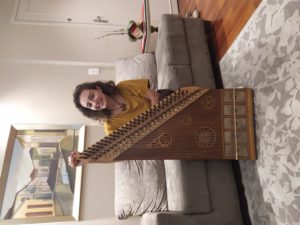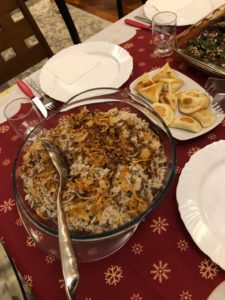Myria and her family opened the door to her house and invited us to dinner and a lot of cultural exchange. They are Syrian refugees and present us with aspects of their culture and history: a delicious typical dinner, live traditional music and heart-wrenching stories. They are, above all, survivors.
Just like us at Be, they aim to live the differences and believe it can promote a better world. Today, they are light. They are an example of resilience and strength and inspire anyone who meets with this family.
The 16 family members came to Brazil in 2013, two years after the start of the war. Two years without water, without electricity and in a situation of food shortage. They left everything they had and faced many obstacles to flee the country. They got the Brazilian tourism visa, but as they themselves said, “The embassy knew that Syrians at that time were not tourists.”
Each one has his own story. Their money was worthless. Their eyes were filled with tears when they relive the memories.
When they arrived in Curitiba, more obstacles. First, the cold. Myria says they were told that Curitiba was a hot city and, therefore, they left their heavier clothes behind. Then, the language. Without knowing a single word of Portuguese, they could only communicate with Google Tradutor. “Imagine the opposite of the situation: you are a newcomer in Syria and want to hire a phone plan but the attendant speaks only Arabic. You can’t.” To go anywhere, they depended on a map.
“It was as if I was a lost child, I didn’t understand anything, I couldn’t speak, I didn’t know where I was or where I was going.”
The Brazilian bureaucracy for immigrants was not easy either. All foreigners who live in Brazil have to report to the Federal Police and apply for the CRNM (National Migration Registration Card). Myria’s, for example, took more than a year to arrive. During this time, she kept the application protocol. Due to lack of knowledge of the Brazilian population, this protocol was denied as a document. The people responsible for the hiring were afraid that it would not be recognized as an official document and preferred “To deal with less problems and not hire us”.

As time passes, the family learned cultural and bureaucratic aspects of the country. Lucia continued her studies at UFPR through a quota for refugees and was the first refugee to graduate from a Federal University in Paraná and the second in Brazil. Her graduation project was a Refugee Reception Center project, which they did not find when they arrived and does not yet exist.
In Curitiba, the few NGOs that helped in the process found it difficult to maintain themselves and had to be closed. Only one remains open (Caritas), but the struggle is daily. The Churches have had a fundamental role in this process, but it is not enough because of the number of refugees that the country receives.
According to them, there are many fairs and refugee events in the city. It was at one of these that Myria met her husband, a Venezuelan refugee.
He told us of a very interesting conversation he had with his father as soon as the war in Syria began. They wondered what life was like for the people in the country when it was at war, whether the children were going to class, whether they were going to work?
Little did they know that in no time they would be facing a similar situation. “It all started gradually. Sometimes we would go out and find a demonstration, sometimes it would take much longer to get home. The lights went out, we didn’t have internet. But we lived our lives. Everything seemed ‘normal’, but it was not. You left home for your routine, but you didn’t know what would happen afterwards.”
It was that feeling that brought the couple together. To know what it was like to be without water and light for two years. To never be sure about the future. Just wanting peace.
They wondered what life was like for the people in the country when it was at war, whether the children were going to class, whether they were going to work?
During the Second World War, the Red Cross treated the wounded, regardless of nationality, religion, skin color or political position. Everyone was human to them. They all wanted an end to the war and peace so that they could return to their families and their lives.
With the end of the war, the Red Cross began to promote programs in which families sent their children to other countries to get to know and experience other cultures. In this way, they would understand that despite our differences, we all have the same goal: to live in peace. This could only be achieved through mutual respect, the understanding that there is no right or wrong, only different.
There is also a story, there is no proof, that in the committee that selected the cities to be bombed in Japan there was a man who removed one of the cities from the list and put Hiroshima in its place. But why? According to this story, he had an affection for a family that lived in that city. This version states that the cultural exchange has as a key aspect the stay in family houses, therefore, to create ties and empathy.
Knowing and respecting each other’s culture is fundamental for a better world. To understand that we all have the same goals. But for that you have to be interested in. Interest in knowing about the other, knowing about stories and issues that don’t always have to do with our own, after all, it’s easier to be interested only in ourselves. The Syrian war started in 2011 and we are in 2019 but it still lasts.
When does someone else’s war become ours? Only when the victims of this violence ask for shelter in our country? When does it literally come close to us? Or to know that there are thousands of dead, wounded and immigrants is not impactful enough to interfere with our routines and questions? What if it were you? Your parents, your friends, your loved ones.

This Christmas dinner of 2019 was a means that the BE team found to know more about the lives and cultures from another continent, but without having to leave the city. We know more than the numbers, we know the people, their stories, stories and testimonies. We brought it to our reality and created empathy.
The dinner, an act so small that it could pass as something routine, reminded us that we can also help. Recognizing this issue, not only of Syria, but of 14 other world conflicts that are occurring at this time, recognize that although Brazil does not have a good infrastructure for the support and reception of these 774.2 thousand immigrants (according to the Ministry of Justice and Public Security, between 2010 and 2018 this was the recorded number of legal support) we can become aware one by one.
We can tell more people to listen to them and understand them (through this dinner), in addition to removing their doubts “live”, we can talk to our acquaintances who are recruiters or work in HR companies about the fact that the CRNM protocol mentioned above can be accepted yes, we can warn you that if you want to learn or practice a language is possible to do it with a native speaker in exchange for teaching Portuguese.
We can contribute to an NGO, or even found one, we can receive these immigrants in our homes or companies, or, like any other situation, we can look the other way and ignore it. Unfortunately, the choice of attitude is individual.
BE believes that by living the differences we can co-create a better world! Remember to co-create…
To find out more about the refugee situation, please visit:
https://www.youtube.com/watch?v=jfynEyD4rUQ
https://www.acnur.org/portugues/dados-sobre-refugio/dados-sobre-refugio-no-brasil/
https://brasil.elpais.com/brasil/2019/05/10/album/1557505831_705389.html#foto_gal_6
https://www.justica.gov.br/news2/collective-nitf-content-1566502830.29
Written by: Cecília Nunes e Thamy Soavinsky.

